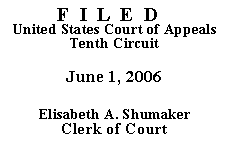

| MICHAEL KEITH ANGEL,
Plaintiff-Appellant, v. TORRANCE COUNTY SHERIFF'S DEPARTMENT; COUNTY OF TORRANCE, a Municipal corporation; PETE GOLDEN, Sheriff, SUSAN ENCINIAS, CHARLES DUBOIS, MICHAEL ROBERTS, and KELLY ROBERTS, acting individually and in their official capacities on behalf of Torrance County and the Torrance County Sheriff's Department; JOHN DOES, as unnamed defendants acting individually and in their official capacities on behalf of Torrance County and the Torrance County Sheriff's Department, Defendants-Appellees. |
|
Amid media attention, defendants arrested and detained Mr. Angel and other individuals in connection with a major drug trafficking investigation. The state magistrate court held a preliminary hearing, made a finding of probable cause, and bound Mr. Angel over for a trial on two felony charges. After Mr. Angel was incarcerated for twelve days, the district attorney filed a nolle prosequi and had the charges dismissed.
Mr. Angel, represented by counsel, brought this suit in federal district court, alleging that defendants should be held liable under 42 U.S.C. § 1983 for arrest without probable cause, unlawful detention, defamation, unreasonable force, and cruel and unusual punishment. He also made state tort claims of aggravated assault and battery, false arrest, false imprisonment, malicious abuse of process, defamation, and negligence. Defendants filed a motion for summary judgment.
In ruling on the motion, the district court carefully analyzed Mr. Angel's § 1983 claims. The court determined that (1) collateral estoppel barred the re-litigation of his arrest claim, see Hubbert v. City of Moore, 923 F.2d 769, 772-73 (10th Cir. 1991) (holding that, where a criminal defendant had full and fair opportunity to litigate the issue, probable cause finding in pretrial criminal proceedings is binding in later civil rights action); (2) plaintiff had no claim for supervisory liability against Torrance County or the Sheriff's Office in the absence of allegations of policy or custom, see Myers v. Okla. County Bd. of County Comm'rs, 151 F.3d 1313, 1318 (10th Cir. 1998) (requiring proof that policy or custom is the moving force behind governmental employee's constitutional violation); (3) qualified immunity protected the individual defendants from plaintiff's claims for damages, see Baptiste v. J.C. Penney Co., 147 F.3d 1252, 1255 (10th Cir. 1998) (stating that qualified immunity shields individual employees from liability unless their conduct violates clearly established rights); (4) plaintiff lacked a factual foundation for his claims of excessive force, illegal search, and cruel and unusual punishment, see Setliff v. Mem'l Hosp. of Sheridan County, 850 F.2d 1384, 1392 (10th Cir. 1988) (requiring more than conclusory allegations to survive summary judgment on a constitutional claim); and (5) defamation alone does not amount to an actionable § 1983 claim, see Siegert v. Gilley, 500 U.S. 226, 233 (1991) (stating that "[d]efamation, by itself, is . . . not a constitutional deprivation").
The district court therefore granted defendants' summary judgment motion as to all federal claims. The court also declined to exercise supplemental jurisdiction over Mr. Angel's state claims and dismissed those claims without prejudice. This appeal followed.
We review the district court's grant of summary judgment de novo and examine the record in the light most favorable to Mr. Angel. Neal v. Lewis, 414 F.3d 1244, 1247 (10th Cir. 2005). "Summary judgment is appropriate if there is no genuine issue of material fact and the moving party is entitled to judgment as a matter of law." Id. Because Mr. Angel is proceeding on appeal pro se, we construe his filings liberally. Id.
Mr. Angel's appellate argument is primarily an attack on the factual basis of state court's probable cause determination. He asserts that the federal district court "should [have been] able to put collateral estoppel aside." Aplt. Br. at 2. Mr. Angel also questions the diligence and motives of his attorney and the existence of the arresting officer's law-enforcement license. After carefully reviewing the parties' briefs, the district court's order, and the record on appeal, we conclude that Mr. Angel has failed to raise a genuine issue of material fact relevant to his § 1983 claims. For substantially the same reasons set out in the district court's order of August 23, 2005, we AFFIRM.
Entered for the Court
Circuit Judge
*. After examining the briefs and appellate record, this panel has determined unanimously that oral argument would not materially assist the determination of this appeal. See Fed. R. App. P. 34(a)(2); 10th Cir. R. 34.1(G). The case is therefore ordered submitted without oral argument. This order and judgment is not binding precedent, except under the doctrines of law of the case, res judicata, and collateral estoppel. The court generally disfavors the citation of orders and judgments; nevertheless, an order and judgment may be cited under the terms and conditions of 10th Cir. R. 36.3.